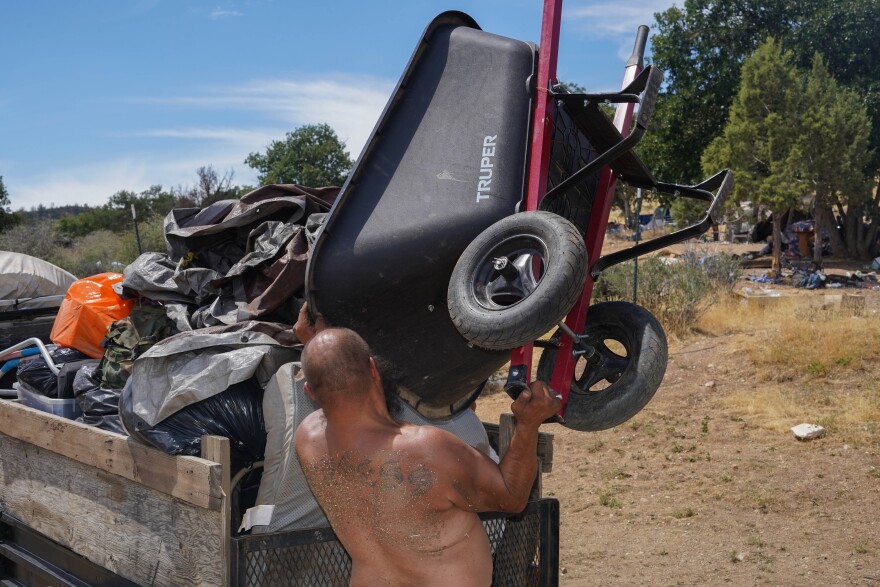It’s 11 a.m. and already getting hot in Yreka. For the first time in two years, Roy Newsom doesn’t know where he’ll sleep tonight.
“I've always, like, had an idea too,” said Newsom, who’s homeless. When police told him to move in the past, he would have another spot in his mind. “Right now, I'm clueless.”
Locals call where Newsom’s been camping “Homeless Hill” — or just “the hill.” It’s city-owned land and in an hour the Yreka Police Department will clear it.
Newsom, who has a daughter and brother also living on the hill, has had a couple weeks of notice to pack up. But right now, as the clock ticks down, he’s sitting in front of his tent, still surrounded by his belongings.
In May, California Governor Gavin Newsom called on local governments to restrict public camping at sites like this one.
But Roy Newsom, on the hill, can’t believe what’s happening is legal.
“I don't know what's going on inside the governor's head,” he said. “But I know that there's no way that he was saying that it's illegal to live outside.”
'We have a family here'
Amy Oliver has also been on the hill for two years. She said the space provided some support for her and her 15-year old daughter.
“We come together as a community here and we do what we have to do to survive,” Oliver said. “We have a family here.”
She said not everyone is kind on the hill. But, as her daughter likes to say, there's bad people with houses too.

Oliver, like Newsom, doesn’t know where she’ll go tonight.
On the other side of the hill, past mounds of garbage and tents with makeshift fences, David Dutra is rummaging through his campsite. He said he’s been here for five years. And he’s deciding what to take as the deadline approaches.
He wanted to make at least a couple trips with his belongings. But the crates he filled are heavier than he thought they would be. He couldn’t find a wagon. And it’s getting hotter. He’ll probably only be able to carry one load.
“I got no family outside of the hill. So me and a buddy are going to go up the creek in the middle of the woods somewhere,” Dutra said. “That's all we can do.”
Outside city limits
At noon on the dot, bull dozers parked on the street crank their engines and move onto the hill. According to a posted sign, whatever personal possessions left on the hill will be stored for 120 days by the city.
Officers spread out and make sure campers know they’re serious. They help a woman pull a wagon and they give out water.
Tara Kilcollins, program manager for Yreka Basecamp, is here offering support. Her homeless shelter opened its doors this week, one of only two in the county for adults.
But she knows a lot of those moving today aren’t going there.
“There's a ton of trails and stuff up here,” Kilcollins said. “That's where they're going to go is just farther up into the park, which creates more of a fire hazard.”

She said they’ll also be further away from help. She used to work at the Siskiyou Behavioral Health Services across the street from the hill. She said she's run over before with the overdose-reversing drug naloxone after hearing screams.
Her 32-bed shelter is already two-thirds full, she said. Tonight she expects it to reach capacity. But even when there’s space, some here prefer the outdoors to the rules of a shelter — even a low-barrier shelter like Basecamp, which doesn’t require things like sobriety or an ID. Kilcollins’ facility, run by Northern Valley Catholic Social Service staff, even allows well-behaved dogs.
For some time, the city had a policy of funneling homeless people to the hill. Police would clear other encampments and direct them here.
Kilcollins said she had argued against the tactic. She was afraid it would create a ghetto. And soon enough she saw something resembling that take root. At its peak, she said, there were around 100 people on the hill.
She said different sections, like neighborhoods, formed. Each section had its own leadership.
“There's always a hierarchy whenever you have people,” Kilcollins said.
Still, she doesn’t agree with clearing the space today.
“They're not actually solving anything, just pushing the problem somewhere else,” Kilcollins said. She said she feels like a lot people just want to give those on the hill a bus ticket so they can find another town.
“But these are our local community members.”
Locals losing patience
Many on the hill are from this city. But Yreka residents like Ken Barnes, who owns Miner St. Meat Market downtown, have had enough. He’s happy to see the encampment go.
“It's affected our business, it's affected our local community,” Barnes said. “It's affected what little tourism draw we had at one point for being a cute little town with a gold rush history.”
His butcher shop has a view of a small city square. He’s watched all sorts of things from his window: drug usage and deals, fights, public bathing. He blames the homeless for that.
Barnes said five years ago people were more understanding. But as the number of tents grew, and the trash piled up, many just reached their limit for caring.
“I've lost some compassion over the last few years, sadly. But I think it's time to do something about the problem,” he said.
He knows clearing the hill won’t solve the problem of homelessness, but at least residents like him will get their hill back. And for him, that’s enough of a solution for now.



